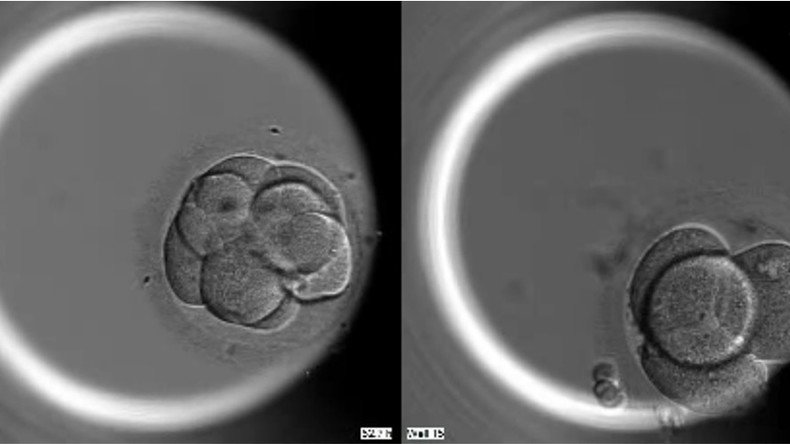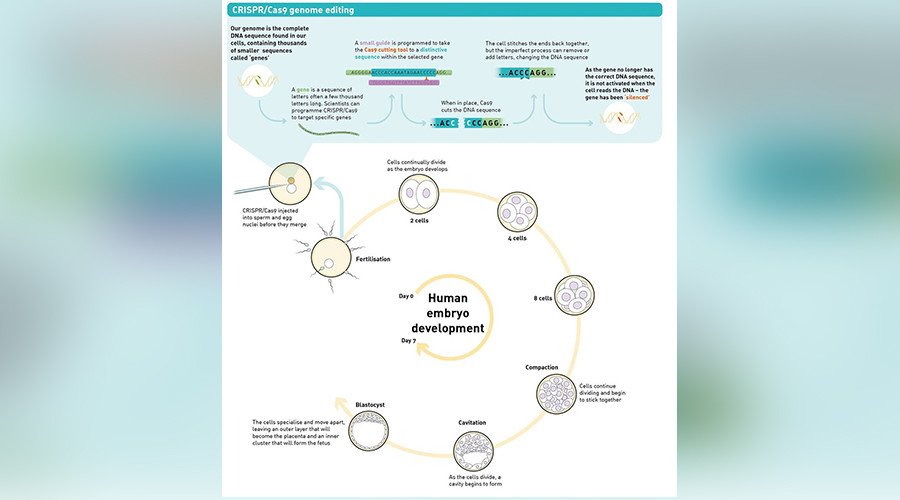Gene-editing unlocks ‘crucial’ DNA in ‘gamechanger’ for IVF, pregnancy research

UK scientists have used a genome-editing tool to change the development of early human embryos in a first of its kind experiment.
Researchers at London’s Francis Crick Institute used a gene-editing technique called CRISPR/Cas9 to change the DNA of 41 human embryos.
After seven days, embryo development was stopped and the specimens were analyzed.
Details of the study, published in Nature, reveal the role a key gene plays in human embryos in the first few days of development.
The genome editing techniques were applied to stop a key gene from producing a protein called OCT4, which normally becomes active in the first few days of human embryo development.
Once the egg is fertilized, it divides for approximately seven days after which it forms a ball of around 200 cells called the 'blastocyst.' The study found that human embryos need OCT4 to correctly form a blastocyst.

"We were surprised to see just how crucial this gene is for human embryo development, but we need to continue our work to confirm its role," lead author Dr Norah Fogarty said.
Studies carried out in mice pointed to a more focused role for OCT4 but scientists say more research is needed around human embryos.
"One way to find out what a gene does in the developing embryo is to see what happens when it isn't working,” Dr Kathy Niakan from the Francis Crick Institute said.
“If we knew the key genes that embryos need to develop successfully, we could improve IVF treatments and understand some causes of pregnancy failure,” she added, explaining that their study was only the first step.
Gene-edited mutant ants create chaotic colony https://t.co/puac6WPIsYpic.twitter.com/HwbL3WZ9e5
— RT (@RT_com) August 12, 2017
The majority of the embryos used in the study were donated by couples who had successfully completed IVF treatment and wanted their remaining embryos to go towards research, according to the Institute.
Before beginning experiments on human embryos, the scientists spent a year optimizing their work on mice embryos and human embryonic stem cells.
News: First study of gene function in human embryos using genome editing reveals vital role of key gene @TheCrickhttps://t.co/cYMB9tTHbnpic.twitter.com/KXTW9c98LG
— The MRC (@The_MRC) September 20, 2017
Rob Buckle, Chief Science Officer at Britain's Medical Research Council, praised the “groundbreaking research.”
"Genome editing technologies - particularly CRISPR-Cas9 used in this study - are having a game-changing effect on our ability to understand the function of critical human genes," he said.
New developments in the controversial technology, however, are often accompanied by fears for a future of ‘designer babies.’
Director of the Crick Institute, Sir Paul Nurse, denied that this was the case. “I don’t buy the ‘slippery slope’ argument, which I see as an extreme version of the precautionary principle — a way to stop something happening that could bring real benefits,” he told the Financial Times.
It is illegal in the UK to edit human embryos for anything other than scientific, ethically-reviewed research.
This study was conducted under a research license with strict regulatory oversight from the Human Fertilisation and Embryology Authority (HFEA) - the UK Government's independent regulator overseeing infertility treatment and research.
DNA breakthrough means ‘superior’ designer babies could form new social elite - geneticist https://t.co/dzX7ycPVRa
— RT (@RT_com) August 7, 2017












